formerly eScholarship Editions


|
|
|
|
Your search for
"History and Philosophy of Science"
in subject
and
Public
in rights
found 29 book(s). | Modify Search | Displaying 21 - 29 of 29 book(s) | |
| 21. | 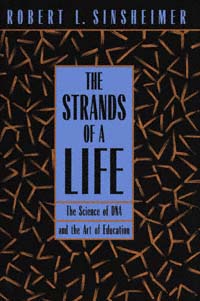 | Title: The strands of a life Author: Sinsheimer, Robert Published: University of California Press, 1994 Subjects: Science | Biology | History and Philosophy of Science | Autobiographies and Biographies Publisher's Description: From heading a campus of the largest public university in the nation to participating in the birth of molecular biology, Robert L. Sinsheimer's experiences have given him a unique vantage point from which to view the paths that science and education have taken in the twentieth century. This book tells the story of his life, of his own growth, and of his leading role in both science and higher learning during the past fifty years.Robert L. Sinsheimer's experiences have given him a unique vantage point from which to view the paths that science and education have taken in the twentieth century. He has witnessed and participated in the birth of molecular biology, taught at leading universities, and headed a campus of the largest public university in the nation. This book tells the story of his life, of his own growth, and of his leading role in both science and higher learning during the past fifty years.While a student and then a researcher at MIT, and as a professor at Iowa State University and later at Caltech, Sinsheimer was a major participant in the "molecular revolution" that radically transformed the science of life. He was also one of the first to foresee the potential of molecular biology and to draw attention to some of the ethical quandaries the new science would pose.In 1977 Sinsheimer became chancellor at the University of California, Santa Cruz, at a crucial time in the campus's evolution. He played a key part in revitalizing the educational experiment that has made the campus unique among the state's institutions of higher learning.Sinsheimer's life has been lived at the ever-advancing edge of knowledge. In simple, elegant language, he offers historical and philosophical insights into the world of science and the mind of a scientist. His reflections are both fascinating and valuable. [brief] Similar Items |
| 22. | 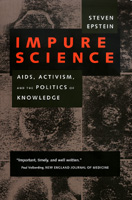 | Title: Impure science: AIDS, activism, and the politics of knowledge Author: Epstein, Steven Published: University of California Press, 1996 Subjects: Social Science | Medicine | Public Policy | History and Philosophy of Science | Sociology Publisher's Description: In the short, turbulent history of AIDS research and treatment, the boundaries between scientist insiders and lay outsiders have been crisscrossed to a degree never before seen in medical history. Steven Epstein's astute and readable investigation focuses on the critical question of "how certainty is constructed or deconstructed," leading us through the views of medical researchers, activists, policy makers, and others to discover how knowledge about AIDS emerges out of what he calls "credibility struggles."Epstein shows the extent to which AIDS research has been a social and political phenomenon and how the AIDS movement has transformed biomedical research practices through its capacity to garner credibility by novel strategies. Epstein finds that nonscientist AIDS activists have gained enough of a voice in the scientific world to shape NIH?sponsored research to a remarkable extent. Because of the blurring of roles and responsibilities, the production of biomedical knowledge about AIDS does not, he says, follow the pathways common to science; indeed, AIDS research can only be understood as a field that is unusually broad, public, and contested. He concludes by analyzing recent moves to democratize biomedicine, arguing that although AIDS activists have set the stage for new challenges to scientific authority, all social movements that seek to democratize expertise face unusual difficulties.Avoiding polemics and accusations, Epstein provides a benchmark account of the AIDS epidemic to date, one that will be as useful to activists, policy makers, and general readers as to sociologists, physicians, and scientists. [brief] Similar Items |
| 23. | 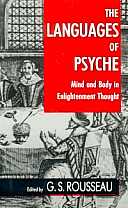 | Title: The Languages of psyche: mind and body in Enlightenment thought: Clark Library lectures, 1985-1986 Author: Rousseau, G. S. (George Sebastian) Published: University of California Press, 1991 Subjects: History | Medicine | History and Philosophy of Science | European History | European Literature Publisher's Description: The Languages of Psyche traces the dualism of mind and body during the "long eighteenth century," from the Restoration in England to the aftermath of the French Revolution. Ten outstanding scholars investigate the complex mind-body relationship in a variety of Enlightenment contexts - science, medicine, philosophy, literature, and everyday society. No other recent book provides such an in-depth, suggestive resource for philosophers, literary critics, intellectual and social historians, and all who are interested in Enlightenment studies. [brief] Similar Items |
| 24. | 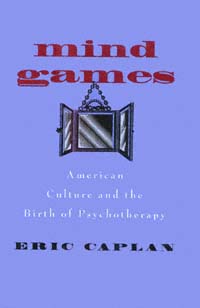 | Title: Mind games: American culture and the birth of psychotherapy Author: Caplan, Eric 1962- Published: University of California Press, 1998 Subjects: History | United States History | American Studies | Science | History and Philosophy of Science Publisher's Description: Eric Caplan's fascinating exploration of Victorian culture in the United States shatters the myth of Freud's seminal role in the creation of American psychotherapy. Resurrecting the long-buried "prehistory" of American mental therapeutics, Mind Games tells the remarkable story of how a widely assorted group of actors - none of them hailing from Vienna or from any other European city - compelled a reluctant medical profession to accept a new role for the mind in medicine. By the time Freud first set foot on American soil in 1909, as Caplan demonstrates, psychotherapy was already integrally woven into the fabric of American culture and medicine.What came to be known as psychotherapy emerged in the face of considerable opposition, much - indeed most - of which was generated by the medical profession itself. Caplan examines the contentious interplay within the American medical community, as well as between American physicians and their lay rivals, who included faith-healers, mind-curists, Christian Scientists, and Protestant ministers. These early practitioners of alternative medicine ultimately laid the groundwork for a distinctive and much heralded American type of psychotherapy. Its grudging acceptance by both medical elites and rank and file physicians signified their understanding that reliance on physical therapies to treat nervous and mental symptoms compromised their capacity to treat - and compete - effectively in a rapidly expanding mental-medical marketplace. Mind Games shows how psychotherapy came to occupy its central position in mainstream American culture. [brief] Similar Items |
| 25. | 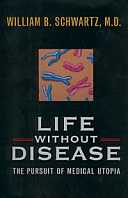 | Title: Life without disease: the pursuit of medical utopia Author: Schwartz, William B 1922- Published: University of California Press, 1998 Subjects: Science | Medicine | Economics and Business | History and Philosophy of Science | Public Policy Publisher's Description: The chaotic state of today's health care is the result of an explosion of effective medical technologies. Rising costs will continue to trouble U.S. health care in the coming decades, but new molecular strategies may eventually contain costs. As life expectancy is dramatically extended by molecular medicine, a growing population of the aged will bring new problems. In the next fifty years genetic intervention will shift the focus of medicine in the United States from repairing the ravages of disease to preventing the onset of disease. Understanding the role of genes in human health, says Dr. William B. Schwartz, is the driving force that will change the direction of medical care, and the age-old dream of life without disease may come close to realization by the middle of the next century. Medical care in 2050 will be vastly more effective, Schwartz maintains, and it may also be less expensive than the resource-intensive procedures such as coronary bypass surgery that medicine relies on today.Schwartz's alluring prospect of a medical utopia raises urgent questions, however. What are the scientific and public policy obstacles that must be overcome if such a goal is to become a reality? Restrictions on access imposed by managed care plans, the corporatization of charitable health care institutions, the increasing numbers of citizens without health insurance, the problems with malpractice insurance, and the threatened Medicare bankruptcy - all are the legacy of medicine's great progress in mastering the human body and society's inability to assimilate that mastery into existing economic, ethical, and legal structures. And if the average American life span is 130 years, a genuine possibility by 2050, what social and economic problems will result?Schwartz examines the forces that have brought us to the current health care state and shows how those same forces will exert themselves in the decades ahead. Focusing on the inextricable link between scientific progress and health policy, he encourages a careful examination of these two forces in order to determine the kind of medical utopia that awaits us. The decisions we make will affect not only our own care, but also the system of care we bequeath to our children. [brief] Similar Items |
| 26. |  | Title: The king's midwife: a history and mystery of Madame du Coudray Author: Gelbart, Nina Rattner Published: University of California Press, 1998 Subjects: History | European History | Women's Studies | Autobiographies and Biographies | French Studies | History and Philosophy of Science | Medicine Publisher's Description: This unorthodox biography explores the life of an extraordinary Enlightenment woman who, by sheer force of character, parlayed a skill in midwifery into a national institution. In 1759, in an effort to end infant mortality, Louis XV commissioned Madame Angélique Marguerite Le Boursier du Coudray to travel throughout France teaching the art of childbirth to illiterate peasant women. For the next thirty years, this royal emissary taught in nearly forty cities and reached an estimated ten thousand students. She wrote a textbook and invented a life-sized obstetrical mannequin for her demonstrations. She contributed significantly to France's demographic upswing after 1760.Who was the woman, both the private self and the pseudonymous public celebrity? Nina Rattner Gelbart reconstructs Madame du Coudray's astonishing mission through extensive research in the hundreds of letters by, to, and about her in provincial archives throughout France. Tracing her subject's footsteps around the country, Gelbart chronicles du Coudray's battles with finance ministers, village matrons, local administrators, and recalcitrant physicians, her rises in power and falls from grace, and her death at the height of the Reign of Terror. At a deeper level, Gelbart recaptures du Coudray's interior journey as well, by questioning and dismantling the neat paper trail that the great midwife so carefully left behind. Delightfully written, this tale of a fascinating life at the end of the French Old Regime sheds new light on the histories of medicine, gender, society, politics, and culture. [brief] Similar Items |
| 27. | 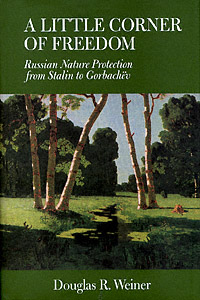 | Title: A little corner of freedom: Russian nature protection from Stalin to Gorbachëv Author: Weiner, Douglas R 1951- Published: University of California Press, 1999 Subjects: Russian and Eastern European Studies | Environmental Studies | Politics | History | History and Philosophy of Science | Ecology Publisher's Description: While researching Russia's historical efforts to protect nature, Douglas Weiner unearthed unexpected findings: a trail of documents that raised fundamental questions about the Soviet political system. These surprising documents attested to the unlikely survival of a critical-minded, scientist-led movement through the Stalin years and beyond. It appeared that, within scientific societies, alternative visions of land use, resrouce exploitation, habitat protection, and development were sustained and even publicly advocated. In sharp contrast to known Soviet practices, these scientific societies prided themselves on their traditions of free elections, foreign contacts, and a pre-revolutionary heritage.Weiner portrays nature protection activists not as do-or-die resisters to the system, nor as inoffensive do-gooders. Rather, they took advantage of an unpoliced realm of speech and activity and of the patronage by middle-level Soviet officials to struggle for a softer path to development. In the process, they defended independent social and professional identities in the face of a system that sought to impose official models of behavior, ethics, and identity for all. Written in a lively style, this absorbing story tells for the first time how organized participation in nature protection provided an arena for affirming and perpetuating self-generated social identities in the USSR and preserving a counterculture whose legacy survives today. [brief] Similar Items |
| 28. |  | Title: Nerves and narratives: a cultural history of hysteria in nineteenth-century British prose Author: Logan, Peter Melville 1951- Published: University of California Press, 1997 Subjects: Literature | History | History and Philosophy of Science | Literary Theory and Criticism | Victorian History | English Literature | Women's Studies Publisher's Description: The British middle class of the early nineteenth century was defined by its nervous complaints - hysteria, hypochondria, vapours, melancholia, and other maladies. Peter Melville Logan explores the link between medical theories of nervous physiology and narrative issues central to the literary writing of the period. He examines the assumption, implicit in medical thinking at the time, that the nervous body - unlike its non-nervous counterpart - has a narrative inscribed on its nerve fibers. It becomes "the body with a story to tell."Logan takes up several literary works whose nervous narrators connect their present disorder with an unnatural, unhealthy social order. Concentrating on novels by Godwin, Hays, and Edgeworth, and on De Quincey's Confessions of an English Opium-Eater , Logan weaves cultural phenomena such as crowd psychology and attitudes toward opium addiction into the basic paradigm of the nervous narrative. He explains why these social critiques always tended to promote the same distempered civilization that brought them into being. He then looks at the emergence of the working-class body in the 1840s, changing medical theories, and George Eliot's treatment of medicine in Middlemarch .Logan's book is especially valuable for its rethinking of disciplinary categories that separate medicine from literature and for bringing to light lesser-known literary texts. With a foreword by Roy Porter, it will be a welcome addition to literary, gender, and cultural studies. [brief] Similar Items |
| 29. | 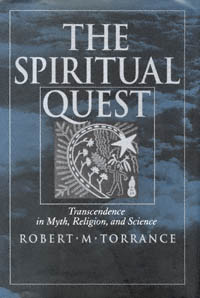 | Title: The spiritual quest: transcendence in myth, religion, and science Author: Torrance, Robert M. (Robert Mitchell) 1939- Published: University of California Press, 1994 Subjects: Religion | Indigenous Religions | Cultural Anthropology | Folklore and Mythology | Language and Linguistics | Philosophy | History and Philosophy of Science | Literature Publisher's Description: Robert Torrance's wide-ranging, innovative study argues that the spiritual quest is rooted in our biological, psychological, linguistic, and social nature. The quest is not, as most have believed, a rare mystical experience, but a frequent expression of our most basic human impulses. Shaman and scientist, medium and poet, prophet and philosopher, all venture forth in quest of visionary truths to transform and renew the world.Yet Torrance is not trying to reduce the quest to an "archetype" or "monomyth." Instead, he presents the full diversity of the quest in the myths and religious practices of tribal peoples throughout the world, from Oceania to India, Africa, Siberia, and especially the Americas. In theorizing about the quest, Torrance draws on thinkers as diverse as Bergson and Piaget, van Gennep and Turner, Pierce and Popper, Freud, Darwin, and Chomsky. This is a book that will expand our knowledge - and awareness - of a fundamental human activity in all its fascinating complexity. [brief] Similar Items |